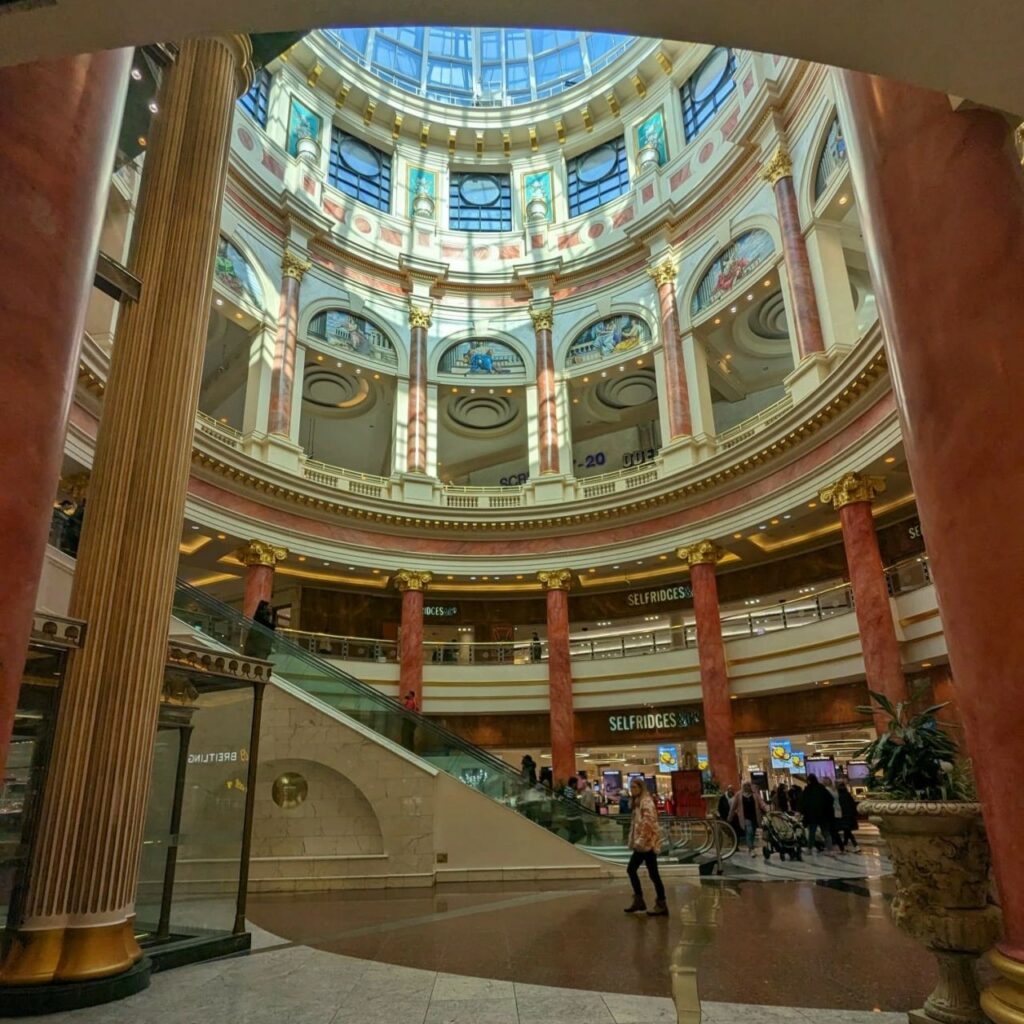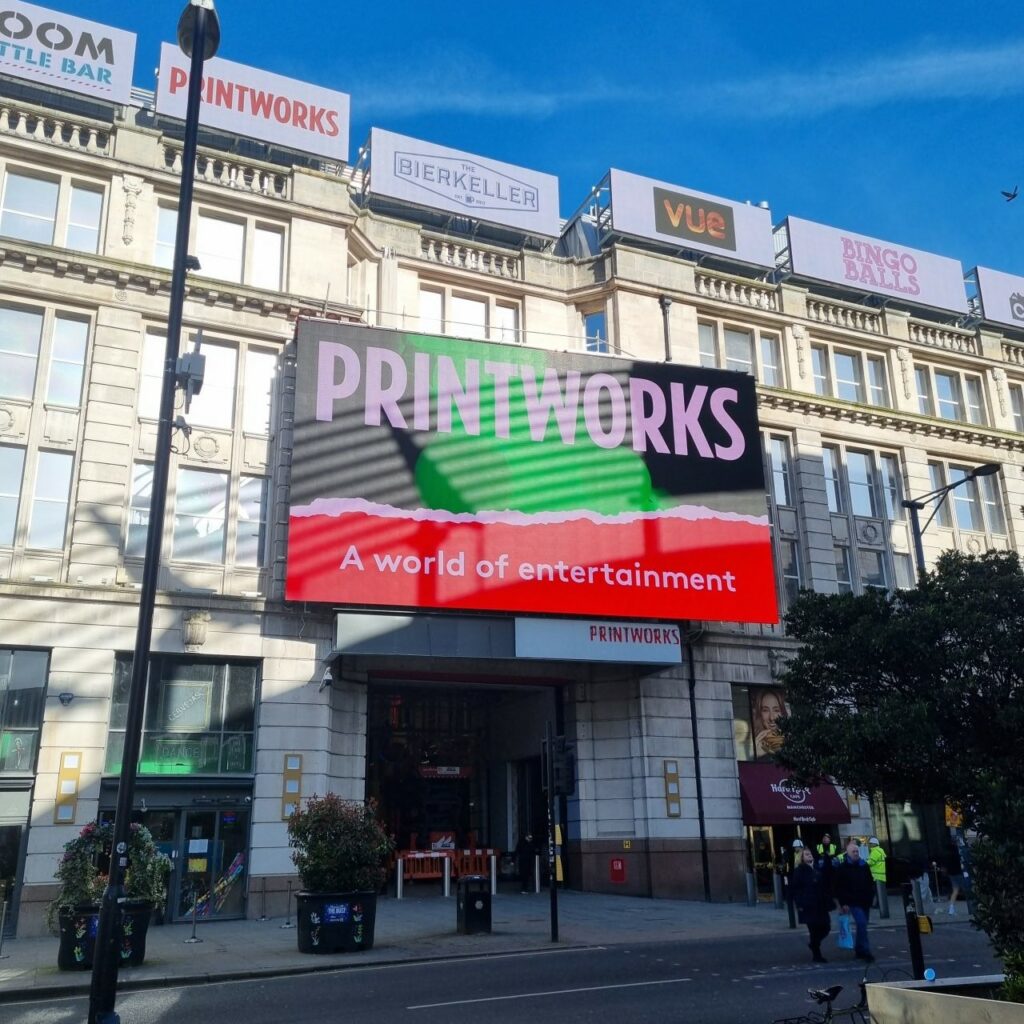Last week, the Toolbox team embarked on a road trip up North, and what an incredible couple of days it turned out to be, packed full of valuable industry insights.
Our journey kicked off with the REVO study tour of the Trafford Centre led by Centre Director, Simon Layton, followed by a guided tour of the Printworks with Office Manager, Wing Liu. The two destinations are distinctly different, but both are prime examples of placemaking at its finest.
The trip continued with our participation in the Retail Destination Live conference, hosted at the icon Old Trafford Cricket Ground. Proudly partnering with ME Group, we had the privilege of exhibiting.
The day was jam-packed with presentations and panel sessions, covering Trends, Challenges, and Opportunities, as well as addressing topics like Safety and Security, and the ever-evolving realm of Evolution and AI.


Our top 5 takeaways from the conference are:
1. Environmental Enhancements
Offline spaces present a unique advantage through the provision of a tangible, physical experience. This encompasses features like water installations, lush green landscapes, architectural splendour, and educational facilities, fostering both individual and communal learning.
Elevating our centres through environmental enhancements, such as the inclusion of bee hotels and green areas, not only adds aesthetic appeal but also aligns with impactful initiatives like the Green Apple Awards.
Making places and spaces come alive with nature is a big passion of ours, one of our favourite examples is at Culver Square in Colchester, where we have created eye-catching sculptures and floral installations as focal points in the scheme.

2. Venturing beyond conventional mixed-used destinations
To enhance the appeal of retail and leisure destinations, it’s crucial to broaden their horizons beyond traditional ‘mixed-use’ concepts. This entails enhancing the destination by offering functional services that people need rather than experiences they desire.
This includes integrating services and amenities to enhance the visitor experience and contribute tangible value to their lives, examples include pop-up launderettes, EV charging points, health drop-in centres and educational facilities.
We are pleased by the fact that numerous destinations where we work are already embracing this progressive approach. Castle Quarter in Norwich is a prime example where we have been able to cater to the evolving needs of the community, the destination is home to a Job Centre, Wellbeing Hub, vaccination centre and Engino a STEM education centre to name just a few of the services they provide.

3. ASB is sadly not going away!
The cost of ASB preventative measures has surged to £3.3 billion, doubling with numbers going in the wrong direction as a result of societal pressures. The rising boldness of individuals has transformed this into a substantial issue across all centres, regrettably presenting a challenge without a readily apparent solution.
Ian Pugh, Director for PAL Protect, emphasised, “Good customer service is great security.” Therefore it is crucial to develop not only an ASB strategy but also a comprehensive customer engagement strategy. Shopping centres, being the heart of communities, need to fully understand the challenges the community faces and have an active approach to addressing them, forming the cornerstone of an effective customer engagement strategy. It becomes paramount for centres to establish a robust code of conduct, comprehended by security personnel who should be empowered and confident in its enforcement.
We collaborate closely with our clients to promote a culture of respect among visitors, with various initiatives introduced to try to combat antisocial behaviour. We have developed partnerships with the local police ensuring that they have a visible presence at our destinations, in particular when there are events taking place.
At Queensgate shopping centre in Peterborough, we launched a campaign called ‘Respect your Place’ that reached out to teenagers inviting them to WhatsApp us to tell us what we could do to help relieve their boredom. The campaign included the installation of TikTok wallpaper in an area where the teenagers in question were congregating.

4. Don’t try to compete with online shopping
A noticeable sense of weariness with online experiences is emerging, particularly around the hassle and unpredictability of online returns coupled with low service levels. This trend is evidenced by a quarter (24%) of consumers returning their items in-store and a further quarter (27%) utilising drop-off points. Therefore rather than competing with the internet, there is an opportunity for destinations to integrate its benefits into our physical spaces.
One strategy is to facilitate convenient returns from online purchases to our centres, thereby increasing footfall, encouraging longer dwell times and increased spending when consumers visit for return purposes.
Across our clients digital platforms we promote the stores that offer return services and additional drop off points like Amazon and InPost Lockers to encourage people to visit the centre to make their returns.

5. How can destinations improve?
Research conducted by Rendle Intelligence and Insights, which sought input from shoppers on how shopping centres could enhance their destinations, revealed intriguing results.
The primary areas identified for improvement are the prevalence of empty stores (84.8%) and the overall environment and atmosphere within the centre (47.8%). Remarkably, only 6% of respondents expressed a need for improvement in customer service within shopping centres.
Empty units have been an ongoing problem over the years and here at Toolbox Marketing, we pride ourselves in our creative activations that convert empty spaces to enhance the offering and provide additional reasons to visit our centres. A prime example of where we have had great success enlivening spaces is Longton Exchange in Stoke on Trent. From school uniform swaps, clothing banks, unwanted gift exchanges and win-a-shop initiatives we ensure that the unoccupied units certainly don’t look like empty to visitors.

